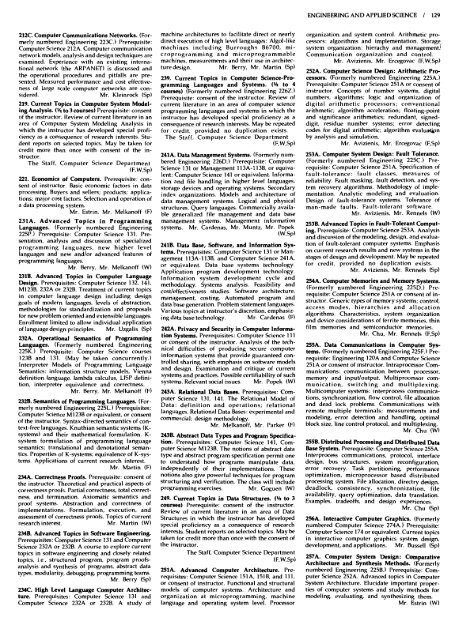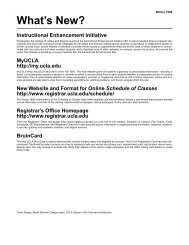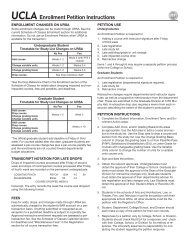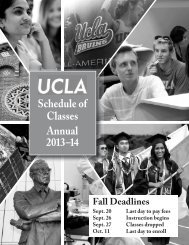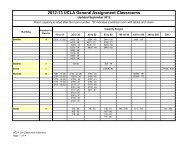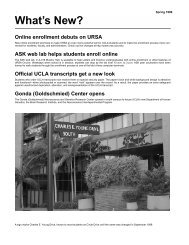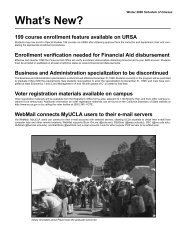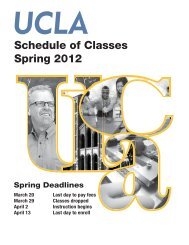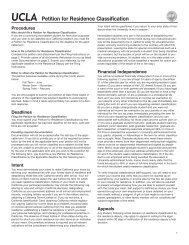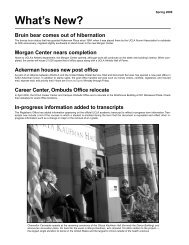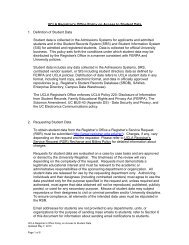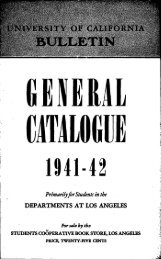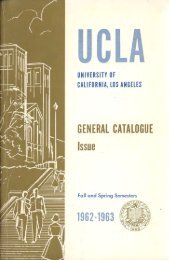UCLA Graduate Catalog 1980-81 - Registrar - UCLA
UCLA Graduate Catalog 1980-81 - Registrar - UCLA
UCLA Graduate Catalog 1980-81 - Registrar - UCLA
Create successful ePaper yourself
Turn your PDF publications into a flip-book with our unique Google optimized e-Paper software.
ENGINEERING AND APPLIED SCIENCE / 129<br />
212C. Computer Communications Networks. (For- machine architectures to facilitate direct or nearly organization and system control. Arithmetic promerly<br />
numbered Engineering 223C.) Prerequisite:<br />
Computer Science 212A. Computer communication<br />
network models, analysis and design techniques are<br />
examined. Experience with an existing international<br />
network (the ARPANET) is discussed and<br />
the operational procedures and pitfalls are presented.<br />
Measured performance and cost effectiveness<br />
of large scale computer networks are considered.<br />
Mr. Kleinrock (Sp)<br />
direct execution of high level languages: Algol-like<br />
machines including Burroughs B6700, microprogramming<br />
and microprogrammable<br />
machines, measurements and their use in architecture<br />
design. Mr. Berry, Mr. Martin (Sp)<br />
239. Current Topics in Computer Science-Programming<br />
Languages and Systems . (f to 4<br />
courses ) (Formerly numbered Engineering 226Z.)<br />
Prerequisite: consent of the instructor. Review of<br />
cessors: algorithms and implementation. Storage<br />
system organization: hierachy and management)<br />
Communication organization and control.<br />
Mr. Avizienis, Mr. Ercegovac (F,W,Sp)<br />
252A. Computer Science Design : Arithmetic Processors.<br />
(Formerly numbered Engineering 225A.)<br />
Prerequisite: Computer Science 251A or consent of<br />
instructor. Concepts of number systems, digital<br />
numbers, algorithms; logic and organization of<br />
219. Current Topics in Computer System Model- current literature in an area of computer science digital arithmetic processors; conventional<br />
ing Analysis. (% to 3 courses) Prerequisite: consent programming languages and systems in which the arithmetic; algorithm acceleration; floating-point<br />
of the instructor. Review of current literature in an instructor has developed special proficiency as a and significance arithmetics; redundant, signed-<br />
area of Computer System Modeling Analysis in consequence of research interests. May be repeated digit, residue number systems; error detecting<br />
which the instructor has developed special profi- for credit, provided no duplication exists. codes for digital arithmetic; algorithm evaluatipn<br />
ciency as a consequence of research interests. Stu- The Staff, Computer Science Department by analysis and simulation.<br />
dent reports on selected topics. May be taken for<br />
(F,W,Sp)<br />
Mr. Avizienis, Mr. Ercegovac (F,Sp)<br />
credit more than once with consent of the instructor.<br />
The Staff, Computer Science Department<br />
(F,W,Sp)<br />
221. Economics of Computers . Prerequisite: consent<br />
of instructor. Basic economic factors in data<br />
processing. Buyers and sellers; products; applications;<br />
major cost factors. Selection and operation of<br />
a data processing system.<br />
Mr. Estrin, Mr. Melkanoff (F)<br />
241A. Data Management Systems . (Formerly numbered<br />
Engineering 226D.) Prerequisite: Computer<br />
Science 131 or Management 113A-113B, or equivalent;<br />
Computer Science 141 or equivalent. Information<br />
and file handling in higher level languages,<br />
storage devices and operating systems. Secondary<br />
index organizations. Models and architecture of<br />
data management systems. Logical and physical<br />
structures. Query languages. Commercially available<br />
generalized file management and data base<br />
253A. Computer System Design : Fault Tolerance.<br />
(Formerly numbered Engineering 225C.) Prerequisite:<br />
Computer Science 251A. Specification of<br />
fault-tolerance: fault classes, measures of<br />
reliability. Fault masking, fault detection, and system<br />
recovery algorithms. Methodology of implementation.<br />
Analytic modeling and evaluation.<br />
Design of fault-tolerance systems. Tolerance of<br />
man-made faults. Fault-tolerant software.<br />
Mr. Avizienis, Mr. Rennels (W)<br />
231A. Advanced Topics in Programming<br />
Languages . (Formerly numbered Engineering<br />
225P.) Prerequisite: Computer Science 131. Presentation,<br />
analysis and discussion of specialized<br />
programming languages, new higher level<br />
languages and new and/or advanced features of<br />
programming languages.<br />
Mr. Berry, Mr. Melkanoff (W)<br />
231B. Advanced Topics in Computer Language<br />
Design . Prerequisites: Computer Science 132, 141,<br />
M123B, 232A or 232B. Treatment of current topics<br />
in computer language design including design<br />
goals of modern languages, levels of abstraction,<br />
methodologies for standardization and proposals<br />
for new problem oriented and extensible languages.<br />
Enrollment limited to allow individual application<br />
of language design principles. Mr. Uzgalis (Sp)<br />
232A. Operational Semantics of Programming<br />
Languages . (Formerly numbered Engineering<br />
225K.) Prerequisite: Computer Science courses<br />
123B and 131. (May be taken concurrently.)<br />
Interpreter Models of Programming Language<br />
Semantics: information structure models, Vienna<br />
definition language, lambda calculus, LISP definition,<br />
interpreter equivalence and correctness.<br />
management systems. Management information<br />
253B. Advanced Topics in Fault-Tolerant Comput-<br />
systems. Mr. Cardenas, Mr. Muntz, Mr. Popek<br />
ing. Prerequisite: Computer Science 253A. Analysis<br />
(W,Sp)<br />
and discussion of the modeling, design, and evalua-<br />
241B. Data Base, Software , and Information Systion of fault-tolerant computer systems. Emphasis<br />
tems. Prerequisites: Computer Science 131 or Man- on current research results and new systems in the<br />
agement 113A-113B, and Computer Science 241A, stages of design and development. May be repeated<br />
or equivalent. Data base systems technology. for credit, provided no duplication exists.<br />
Application program development technology.<br />
Mr. Avizienis, Mr. Rennels (Sp)<br />
Information system development cycle and<br />
254A. Computer Memories and Memory Systems.<br />
methodology. Systems analysis. Feasibility and<br />
(Formerly numbered Engineering 225D.) Pre-<br />
cost/effectiveness studies. Software architecture,<br />
requisite: Computer Science 251A or consent of in-<br />
management, costing. Automated program and<br />
structor. Generic types of memory systems; control,<br />
data base generation. Problem statement languages.<br />
access modes, hierarchies and allocation<br />
Various topics at instructor's discretion, emphasiz-<br />
algorithms. Characteristics, system organization<br />
ing data base technology. Mr. Cardenas (F)<br />
and device considerations of ferrite memories, thin<br />
242A. Privacy and Security in Computer Informa- film memories and semiconductor memories.<br />
tion Systems . Prerequisites: Computer Science 111<br />
Mr. Chu, Mr. Rennels (F,Sp)<br />
or consent of the instructor. Analysis of the tech-<br />
255A. Data Communications in Computer Sysnical<br />
difficulties of producing secure computer<br />
tems. (Formerly numbered Engineering 225F.) Pre-<br />
information systems that provide guaranteed conrequisite:<br />
Engineering 120A and Computer Science<br />
trolled sharing, with emphasis on software models<br />
251 A or consent of instructor. Intraprocessor Com-<br />
and design. Examination and critique of current<br />
munications: communication between processor,<br />
systems and practices. Possible certifiability of such<br />
memory and input/output. Multiprocessor com-<br />
systems. Relevant social issues. Mr. Popek (W)<br />
munication , switching and multiplexing.<br />
Mr. Berry, Mr. Melkanoff (F) 243A. Relational Data Bases . Prerequisites: Com- Multicomputer systems: interprocess communica-<br />
232B. Semantics of Programming Languages. (Formerly<br />
numbered Engineering 225L.) Prerequisites:<br />
Computer Science M123B or equivalent, or consent<br />
of the instructor. Syntax-directed semantics of context-free<br />
languages. Knuthian semantic systems (Ksystems)<br />
and their mathematical formulation. Ksystem<br />
formulation of programming language<br />
semantics; translational and denotational semantics.<br />
Properties of K-systems; equivalence of K-sysputer<br />
Science 131, 141. The Relational Model of<br />
Data: definition and operations; relational<br />
languages. Relational Data Bases: experimental and<br />
commercial; design methodology.<br />
Mr. Melkanoff, Mr. Parker (F)<br />
243B. Abstract Data Types and Program Specification.<br />
Prerequisites: Computer Science 141, Computer<br />
Science M123B. The notions of abstract data<br />
type and abstract program specification permit one<br />
tions, synchronization, flow control, file allocation<br />
and dead lock problems. Communications with<br />
remote multiple terminals: measurements and<br />
modeling, error detection and handling, optimal<br />
block size, line control protocol, and multiplexing.<br />
Mr. Chu (W)<br />
255B. Distributed Processing and Distributed Data<br />
Base System. Prerequisite: Computer Science 255A.<br />
Interprocess communications, protocol, interface<br />
tems. Applications of current research interest. to understand how programs manipulate data, design , bus structures , system reconfiguration,<br />
Mr. Martin (F) independently of their implementations. These error recovery. Task partitioning, performance<br />
234A. Correctness Proofs. Prerequisite: consent of<br />
the instructor. Theoretical and practical aspects of<br />
correctness proofs. Partial correctness, total correctness,<br />
and termination. Axiomatic semantics and<br />
proof systems. Abstraction and correctness of<br />
implementations. Formulation, execution, and<br />
assessment of correctness proofs. Topics of current<br />
research interest. Mr. Martin (W)<br />
notions also give powerful techniques for program optimization, microprocessor based distributed<br />
structuring and verification. The class will include processing system. File allocation, directry design,<br />
programming exercises. Mr. Goguen (W) deadlock, consistency, synchronization, file<br />
availability, query optimization , data translation.<br />
249. Current Topics in Data Structures . (' to 3<br />
Examples, tradeoffs, and design experiences.<br />
courses) Prerequisite: consent of the instructor.<br />
Mr. Chu (Sp)<br />
Review of current literature in an area of Data<br />
Structures in which the instructor has developed 256A. Interactive Computer Graphics . (Formerly<br />
special proficiency as a consequence of research numbered Computer Science 274A.) Prerequisite:<br />
234B. Advanced Topics in Software Engineering.<br />
Prerequisites: Computer Science 131 and Computer<br />
Science 232A or 232B. A course to explore current<br />
topics in software engineering and closely related<br />
topics, i.e., structured program, program proofsanalysis<br />
and synthesis of programs, abstract data<br />
types, modularity, debugging, programming teams.<br />
Mr. Berry (Sp)<br />
interests. Student reports on selected topics. May be<br />
taken for credit more than once with the consent of<br />
the instructor.<br />
The Staff, Computer Science Department<br />
(F,W,Sp)<br />
251A. Advanced Computer Architecture. Prerequisites:<br />
Computer Science 151A, 151B, and 111,<br />
or consent of instructor. Functional and structural<br />
Computer Science 174 or equivalent. Current topics<br />
in interactive computer graphics system design,<br />
development, and applications. Mr. Bussell (Sp)<br />
257A. Computer System Design: Comparative<br />
Architecture and Synthesis Methods. (Formerly<br />
numbered Engineering 225B.) Prerequisite: Computer<br />
Science 252A. Advanced topics in Computer<br />
System Architecture. Elucidate important proper-<br />
234C. High Level Language Computer Architec- models of computer systems. Architecture and ties of computer systems and study methods for<br />
ture . Prerequisites: Computer Science 131 and organization at microprogramming, machine modeling, evaluating, and synthesizing them.<br />
Computer Science 232A or 232B. A study of language and operating system level. Processor<br />
Mr. Estrin (W)


